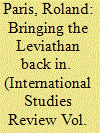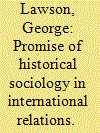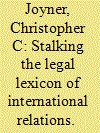| Srl | Item |
| 1 |
ID:
075357


|
|
|
|
|
| Publication |
2006.
|
| Summary/Abstract |
There are crucial differences between classical and contemporary conceptions of the liberal peace thesis, or the proposition that liberally constituted states tend to be more peaceful in domestic affairs, in their relations with other states, or both. Classical liberals such as Locke and Kant believed that peace depended not only on liberal political and economic arrangements but also on a functioning state apparatus, capable of upholding the rule of law and containing societal competition within peaceful bounds. By contrast, modern liberal peace scholars have tended to treat functioning state institutions as a given, focusing instead on the relationship between violent conflict and different types of (already constituted) regimes. As a result, findings from modern scholarship do not necessarily apply to states just emerging from civil wars with damaged, dysfunctional, or nonexistent governmental institutions. Given the abundance of post-conflict peacebuilding operations and failed or failing states in the world today, liberal peace scholars would do well to revisit classical liberalism's dual emphasis on building liberal and effective states as a foundation for peace.
|
|
|
|
|
|
|
|
|
|
|
|
|
|
|
|
| 2 |
ID:
075356


|
|
|
|
|
| Publication |
2006.
|
| Summary/Abstract |
This essay draws on historical sociology, in particular on historical institutionalism, to critique the micro-, macro-, and meso-level explanations of contemporary international relations theory. Focusing on institutional development, change, and disintegration, it proposes a conjectural, mid-range approach to capturing the processes of large-scale change that are occurring in the international realm. This essay seeks to broaden the field's scope by outlining the possibilities that historical sociology offers to international relations theory and practice.
|
|
|
|
|
|
|
|
|
|
|
|
|
|
|
|
| 3 |
ID:
075370


|
|
|
| 4 |
ID:
075369


|
|
|
|
|
| Publication |
2006.
|
| Summary/Abstract |
This essay examines the interconnectedness among realism, elitism, and conservatism, claiming that realism cannot be understood in isolation from conservative skepticism regarding human nature and the possibility of change. Just as conservatism constitutes the foundation of realism, so it also constitutes the foundation of elitist and structural theories of democracy, thereby establishing an inherent interconnection among the three. Such interconnectedness lies at the root of the antagonism that realists display toward policies that aim to promote democracy. Contrary to the common wisdom among international relations scholars, it also implies a strong link between international relations and political science. Moreover, this interconnectedness discredits the positivist philosophy of the social sciences, calling instead for a normative philosophy of the social sciences.
|
|
|
|
|
|
|
|
|
|
|
|
|
|
|
|